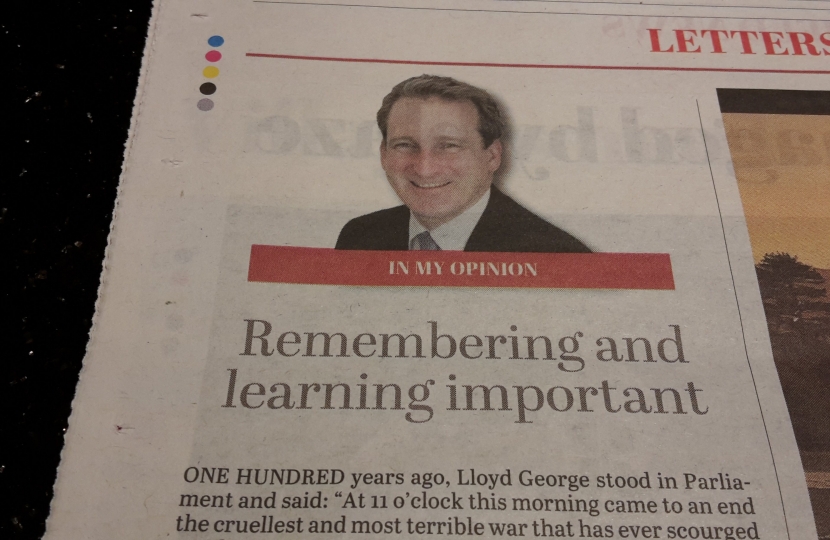
Damian writes a regular column in the Petersfield Post, with the centenary of the end of World War 1 the focus of today's piece:
"100 years ago, Lloyd George stood in Parliament and said “At eleven o’clock this morning came to an end the cruellest and most terrible war that has ever scourged mankind. I hope we may say that thus, this fateful morning, came to an end all wars.” Parliament then adjourned to St Margaret’s Church to reflect, to commemorate those who had made the ultimate sacrifice, and to give thanks for the peace.
As we mark the centenary of what became known as the Great War we know that Lloyd George’s hope was sadly misplaced; this was not the end of all wars. In only another 20 years Europe would once again be torn apart by conflict, and the Great War became just the First World War.
And parallel and following events – regime change on a grand scale, from the Russian Revolution to the collapse of the Austro-Hungarian and Ottoman Empires – have had long-lasting effects, some of which are still with us today.
The seismic shifts in political, social and economic change in the post war period were possibly inevitable, but we now understand the full horror wrought by the rise of fascism and communism with the return to war in 1939.
Learning about the First World War is important, because the study of the past can help us shape the future. Many schools have taken this moment of the centenary to learn about some of the wider aspects, as have many community groups up and down the country.
And we need to remember the true horrors of war - the inexplicable cruelty between people divided by different beliefs, identities and even geography. Modern warfare may have changed, but the human tragedy of hatred and intolerance remains as profound and dangerous as it ever has been.
But we must also remember the bravery. The individual moments of courage, of sacrifice and even kindness; these human stories are both inspirational and timeless.
Last Sunday I was privileged to attend the National Service of Remembrance at the Cenotaph, standing in tribute alongside other ministers, and all parties, and the representatives of all religions and the nations of the Commonwealth, and the President of Germany.
The significance of this centenary service was particularly marked, along with the thousands of commemorations taking place across the country. The services in Petersfield, Bordon, Alton and across East Hampshire are always deeply poignant and brilliantly organised by the Royal British Legion, and it has been so good to see large and growing attendances.
And of course there is the annual Poppy Appeal, run by an army of dedicated volunteers. As in previous years, I was delighted to join the local appeal launch in Liphook a few weeks ago, and was once again struck by the great generosity of our local communities.
The poppy remains such a simple yet powerful symbol of survival. The Flanders flower that endured the ravages of war, inspiring poets, writers and artists across the decades since. And reminds us all still."
Written by Damian Hinds and published in the Petersfield Post on 14th November 2018

